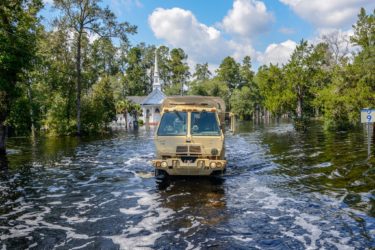
Event Recap: Flooding the Gates
On February 11th, American Security Project (ASP) hosted a discussion on climate security featuring Lieutenant General Norman Seip, USAF (Ret.) and Congressman Don Beyer (D-VA). The discussion was moderated by ASP’s Climate Security Program Manager Esther Sperling.
Given his years of experience in the Air Force, Lt. Gen. Seip highlighted the national security implications of climate change. First and foremost, he explained that climate change is a “threat multiplier.” Climate change has the potential to create instability and threaten national security interests. In that vein, he highlighted the role climate change will play in great power competition, primarily in the Arctic and Pacific. He also highlighted the pressure increased usage of renewables will have on U.S. adversaries, specifically on the budgets of Russia and Iran. Lt. Gen. Seip underscored the need to address not just the symptoms of climate change.
“We are dabbling with the symptoms. We as a country need to go after the cause of climate change.”
Congressman Beyer and Lt. Gen. Seip agreed: bipartisanship is critical to addressing climate change. Following his election in 2014, he organized a special hearing on the national security implications of climate change. He noted that while there may be congressional bipartisanship on issues related to climate change, without presidential leadership moving forward will be difficult.
The congressman also noted the challenges climate change poses to emerging economies. In China and India, large population centers are concentrated along the coasts. Unfortunately, many of these cities are ill-equipped to deal with flooding and rising sea levels. How these countries elect to manage flooding and rising seas, will be instrumental in preventing instability.
As a leading voice on climate security, ASP has developed a body of work on the national security implications of climate change. Recent ASP publications on climate-driven migration in the northern triangle, the destabilizing effects of climate change in sub-Saharan Africa, and great power competition in Asia all provide analysis on the issues raised by Lt. Gen. Seip and Congressman Beyer.
Additional Resources:
The US or China: Who is the better bet?
16.1 Million People Displaced By Weather Disasters, More Than By Conflict
Climate Change Will Drive Future Epidemics. How Are We Preparing?
Climate Security Legislative Tracker, 2019-2020
Perspective – Strained Stability: Climate Change and Regional Security in Southeast Asia
Perspective – Climate Change and Migration in Central America’s Northern Triangle
Factsheet: Climate Change Impacts on National Security





